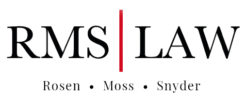Back pain is a widespread problem for working men and women. Although back pain can appear and go away in a matter of days with compresses, rest, and proper body mechanics (i.e., picking up packages with legs rather than lower back), sometimes back pain can be persistent and debilitating. When back pain becomes chronic, it can severely impact your productivity at work – or even prevent you from getting out of bed or performing simple physical tasks. In these cases, you may be eligible for short- or long-term disability benefits to make up for the loss of income and increased medical expenses.
Unfortunately, some insurance companies might not consider your back pain to be severe or persistent enough to qualify you for disability benefits. For more information on debilitating back pain causes and symptoms that can lead to successful claims for disabled professionals in the Philadelphia, PA, region read below.
Types & Symptoms of Debilitating Back Pain
As we mentioned above, back pain is widespread, especially in working adults. According to the American Chiropractic Association, at any given time, over 31 million Americans will experience some level of lower back pain. Back pain is also the cause of over 264 million lost workdays per year.
Here are a few principal reasons for debilitating back pain:
- Muscle Strains & Sprains
The back is a complicated network of muscles, ligaments, nerves, joints, and bones that are extremely sensitive to physical stress. Muscle strains, or the tearing of a tendon or muscle, and muscle sprains, or the tearing of a ligament, can be caused by many things, including repeated or unnatural movements and incorrect posture. Inflammation can result, causing muscle stiffness, range of motion restrictions, and mild to debilitating pain. - Osteoarthritis (Spine)
Osteoarthritis of the spine can occur from the wear-and-tear of spinal cartilage. When the cartilage wears down, bone-on-bone friction causes painful popping sensations. Eventually, the body produces painful bone spurs to stabilize the joint. - Bulging or Herniated Disc
Your spinal discs are nature’s shock absorbers, but they can deteriorate over time, encouraging them to bulge or protrude. This protrusion is precipitated by many things, including aging, spinal trauma, lifting heavy objects, and even sitting too long. If left untreated, bulging discs can tear, causing nerve root compression, sharp lower back pain, and muscle weakness. - Sciatica
The sciatic nerve is the longest in the body that originates from the base of the spine and moves down both legs. Sciatica happens when the nerve is compressed as a result of a ruptured disc, bone spur, a lower-body injury, or prolonged sitting. Lower back pain and leg pain that goes right to the soles of the feet are common symptoms. - Osteoporosis
Osteoporosis is the natural weakening of bones which makes them more prone to fracturing or breaking. Back pain caused by osteoporosis is usually related to a vertebral compression fracture, which results in chronic pain in the lower and middle back. Pain can sometimes radiate to other areas of the body and is usually worse with motion and is eased with rest.
Call Our Team for a Consultation Now!
Debilitating back pain can result from various problems that range from the ubiquitous ones we have listed here to rarer issues, including tumors, infections, ankylosing spondylitis, and cauda equina syndrome. Although back pain is quite prevalent in working communities, debilitating pain can result in income loss and costly medical expenses.
If you have debilitating back pain, and you have been denied disability or have had your benefits cut short, call Rosen Moss Snyder LLP, the long-term disability lawyers serving the Philadelphia, PA, region today!
